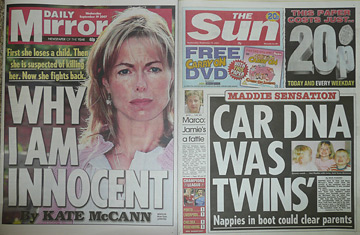
London papers, Wednesday, Sept. 19, 2007
There's been no shortage of surprises in the ongoing saga of Madeleine McCann, the 4-year-old British girl who disappeared from her family's vacation apartment in Portugal more than four months ago — the biggest shock occurring earlier this month when Portuguese police officially named her parents as suspects. Still, it was somewhat stunning when a YouGov poll published in the Sunday Times of London this week found that only 20% of Britons think Gerry and Kate McCann are completely innocent.
That indicates a huge disconnect between the public and Britain's many and multifaceted newspapers, which are usually adept at playing to their readers' biases. The press here — from populist tabloids to serious-minded dailies — has largely been unswerving in its support of the McCanns. "Madeleine: Her Mother is Innocent," shouted Wednesday's Daily Express. "Torture," declared Sunday's The People over a picture of Kate McCann, Madeleine's mother. And Chris Roycroft-Davis, a media consultant and Express commentator, thinks that's how it should be. "The media have been very, very sympathetic toward the McCanns, quite rightly so," he said on a Sunday morning BBC Radio 2 program.
Other analysts think the pro-McCann tilt is a mistake. "The press have treated the parents almost too nicely," says Adrian Monck, head of London's City University's Department of Journalism, and that could backfire if any portion of the Portuguese police's suspicions that the McCanns might know more than they are saying proves correct. Adds Charlie Beckett, a media and communications expert at the London School of Economics: "The media have almost been campaigning on behalf of the McCanns instead of adopting a more balanced position. Now they're finding it much harder to change tack."
In the wake of the police actions, however, some are trying. The Daily Mail's David Jones wrote that while he hopes the police are wrong, "a terrible nagging doubt has refused to leave me." It may be "unpalatable," he adds, but "we can no longer take their innocence as an absolute, cast-iron certainty." Olga Craig in the Sunday Telegraph recently described Kate McCann, pointedly, as cold and distant. Some publications are hedging their bets with a two-track approach: supporting the McCanns, but also printing stories that tend to bolster the police line of inquiry. London's Evening Standard recently quoted sources as saying critics of the DNA evidence — which early reports said implicated the McCanns — didn't know what they were talking about, that investigators had "full confidence" in test results. Yet, on the next page, the paper ran a two-page spread headlined, "Despite the accusations, facts are on their side."
Most commentators, however, remain resolutely supportive of the couple, including Jones's Daily Mail colleague, Allison Pearson. "I refuse to believe they are guilty unless overwhelming evidence is uncovered," she wrote. Of course, she's basically saying they're innocent until proven guilty — hardly a radical thought, since it's the bedrock of Western jurisprudence. Roycroft-Davis, however, has apparently solved the case. He said on Radio 2: "These people are completely innocent. There's no evidence that I've read that shows that they've got any part whatsoever in Madeleine's disappearance."
Ah yes, evidence. How much is there and how strong is it? That remains known only to Portuguese legal officials, suppressed for now by Portuguese law. When a Portuguese prosecutor declared Wednesday that there is currently no plan to interrogate the McCanns again, British papers claimed the police probe of the couple was "crumbling" or in "meltdown." But by saying more evidence was needed, he was mainly reiterating what police plainly said last week: They don't have enough evidence yet to charge the McCanns.
So most of the debate over evidence is based largely on leaks of varying degrees of reliability. Says Beckett: "In a vacuum of facts, it's usually best to hold back." But given the fierce rivalry that defines the British media, holding back isn't an option. So they've been awash with leaks, rumors and anonymous quotes. Much of the info actually originates with the Portuguese press. Able to cite Portuguese news outlets as their sources, U.K. papers have repeated even the most outlandish of claims. One report, since debunked, said police thought Madeleine had been weighted down and dropped at sea from a British-registered yacht.
Some critics think the story has been overplayed from the start. "It's not intrinsically important," says Peter Kellner, journalist and YouGov president. "It's a horrible thing for the family, for a small group of people. But everyday, thousands of people around the world have to cope with horrible events." Still, Monck believes that British editors have seized upon the story because they identify with the McCanns: They, too, are middle-class professionals, many of whom have children and have taken similar vacations.
The McCanns, of course, initially helped whip up public interest in the disappearance. After Madeleine first went missing, they launched a massive media campaign that was endorsed by celebrities — billionaire entrepreneur Richard Branson this week started a McCann defense fund with around $200,000 of seed money — and they even got a meeting with the Pope. The YouGov poll indicated that some of the anti-McCann sentiment in the U.K. is a negative response to their self-generated publicity.
The poll's overwhelming results did, however, surprise Kellner, given the press's ongoing support for the McCanns. Nevertheless, he notes, "Even if you are reporting it in a sympathetic way, you are still saying they are suspects, and news of them being suspects swamps the sympathetic coverage." British readers may disagree with the tone of the coverage, or they may think the story is overplayed, but until the case is resolved in some fashion, the McCann media circus is here to stay.
